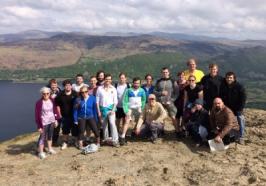News topics
Monthly Newsletters
// //// //// Online Booking //
// //// // // // // // //
For group bookings please contact
017687 77246 or
contact@derwentwater.org
Dot Crotchets Singing Group, September 2017
May 2016
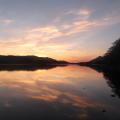
May has been a wonderful month of growing and giving, with healthy lambs at Ashness Farm, glossy calves at Watendlath, wild garlic at Kettlewell, bluebells of purple-pink-and blue-and white hues, a big watermelon from the Network Youth Church, a huge box of crisps from the Enderby Mission Walking Group, and some really thoughtful thank you letters from Ashfield School.
The weather has been fantastic for our primary school groups, including Newbarns School, generously supported by the Sir John Fisher Foundation, and Ghyllside School, who walked with Katy through the bluebells of Strutta Wood to see the lambs and other animals at Ashness Farm.
We hope you enjoy reading about these visits, as well as the Warwick University MOAC (Molecular Organisation and Assembly in Cells) Conference, and the conversation between our April volunteers Kinga and Eva.
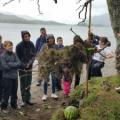
Wonder Youth Ministry and Ignite Penrith are the youth ministries for the Derwent and Penrith Deaneries, serving Cockermouth, Keswick, Penrith and surrounding villages. This new residential, supported by our DIH Fund, enabled 19 children, from different church youth groups, to come together for a weekend of outdoor activities, bible study, prayer, and discussion, organised with great enthusiasm by Sudharshan Sarvananthan. In his application for the grant, Sudharshan explained:
‘Our youth work consists of small groups and youth clubs and as part of our strategy we are trying to bring the groups together so that they may get new friends, have fun together, explore the Christian faith and see that they are part of something bigger than what is going on in their particular town or village. The focus is on exploring life and faith from a Christian perspective and connecting with other young people on this journey. We also hope that the weekend at Derwentwater will be a great opportunity for those young people whose families are struggling to make ends meet.’
The weekend was a great success and Sudharshan was happy to see the young people growing in confidence, making new friends and taking part in all the activities.
P.S Thank you for the watermelon!
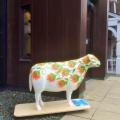
Last month we featured one of the decorated model ewes from the Calvert Trust public art project, Go Herdwick. There are 60 in total, dotted around the Lake District, so we thought we would show you another one, this time outside Keswick Museum. There are now also lots of decorated lambs in different locations: how many can you spot (if you live locally or are visiting in the next few months)?
Keswick Museum is also worth visiting for the exhibition Wainwright: A Love Letter to the Lakeland Fells, which opened at the end of May. This is similar to last year’s exhibition, but with some new material, interpretation, talks and activities.

Get ready for acronyms! From 15th to 18th May the hostel became a conference venue, for the annual University of Warwick MOAC/ASMIT/MASCDT conference. ASMIT stands for Analytical Science: Methods and Instrumental Techniques. MASCDT stands for Molecular Analytical Sciences Centre for Doctoral Training. MOAC stands for Molecular Organisation and Assembly in Cells. The Doctoral Training programmes at Warwick helps bright science graduates become multidisciplinary researchers, focusing on the molecular end of cellular function, and this conference brought together many different areas of research.
By the end of the week, almost every available wall space was covered in masters and doctoral thesis posters, and I could hear interesting things coming from the ‘Art of Science and the science of Art’ discussions. I half-attempted to read the posters, but swiftly decided that I was better suited to primary school activities.
As well as the talks, presentations, and workshops, the students and staff did a ‘pub’ quiz in the dining room (complete with coloured lightbulb buzzers!) and a dragon boat race on Derwent Water, with boats from Platty+. Some of the students also went for pre-breakfast runs or 'refreshing' swims in the lake. Overall, the conference seemed to go very well, and we hope more university groups will visit us in the future.
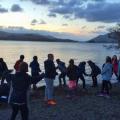
Thank you to Newbarns for bringing us beautiful weather! After the snow and sleet of May Day, we were worried about whether the leaves would ever come out on the trees, but sure enough, Newbarns brought sunshine, warmth, and energy, enjoying a wonderful few days of outdoor activities.
Located near Barrow in Furness, Newbarns School qualified for a grant from the Sir John Fisher Foundation, which specifically supports projects and organisations in the Barrow area. We secured this grant last year, and we are delighted that it helped Newbarns to subsidise their residential.
The activities started on the journey to Derwentwater, with a trip on the Haverthwaite Railway and the Windermere Ferry. Then, after some playtime and tea, the group walked up to Ashness Bridge and along the lakeshore, watching the beautiful dusk.
The second day included a good walk to Walla Crag, a boat ride on the Keswick Launch, and some camp-craft activities in the evening. Some very well-designed shelters appeared in the grounds, and good smells of hot chocolate issued from the camping stoves.
On the last day the pupils went on another walk before returning to school. Thank you to Newbarns for an excellent residential: it was great to see you making the most of the Sir John Fisher Foundation grant.

In April we were really fortunate to have two volunteers, from different parts of Europe: Kinga from Hungary and Eva from Spain.
It was great to have Kinga back with us for a month: as you may know, she volunteered with us for 3 months last autumn, and we are very glad that she wanted to come back before going to university. Kinga was particularly glad to get here, following a difficult journey in which she was delayed in Brussels due to terrorist attacks.
Safely in peaceful Borrowdale, Kinga and Eva walked up Skiddaw with Nicola, kayaked on the lake, and made delicious chocolate brownies for us all. We really enjoyed their company, and they were a great help around the hostel. One day, during a particularly big sandwich-making session, they let me take notes of their conversation. Here is my version of the sandwich sessions…
Kinga: Have you been to any music festivals?
Eva: Yes, twice to S.O.S in Murcia, Spain. One time the campsite was full so ten of us stayed in a big house with a swimming pool: quite luxurious for a festival! In contrast, I went to a festival in Luxembourg where we didn’t have a camping ticket so we just slept outside in our sleeping bags. There was music until 6am and it was really fun to party throughout the night. What about you?
K: I’ve been to 3 summer festivals in Hungary: Volt Festival, Sound Festival, and Sziget Festival. I went with my brother and his friends (I was the only girl!), but we only had ‘day’ tickets (from about 9pm to 6am!). They are best at midnight: I love all the lights and decorations, and there are lots of people from around the world – you don’t know each other, but you are like friends, and I love holding hands to make a chain and dance all together.
E: What kind of music do you like? Are there any Hungarian bands that you like?
K: I like lots of different music but one of the Hungarian bands that I like is ‘Bikini’, and one day I happened to meet their drummer on a bus in my home town! What about you?
E: I like lots of different music, such as Bob Dylan, Pink Floyd, the Rolling Stones, Arcade Fire, The Kooks, Bon Iver, Morrissey, Amy Winehouse, Radiohead, and Explosions in the Sky. Spanish groups: Boreals, Was, and Jean Benaveute.
K: Have you been to any hostels in Spain?
E: Yes, I went to one in Llanes, near Santander, for my birthday in December. I was born in Santander and so the travel was like a memory. I had asthma as a child, and the sea air was not considered good for it, so we moved to Madrid when I was young.
K: I stayed in a hostel in Edinburgh with Guilia, the Italian girl who volunteered with me here in September. To our surprise the receptionist at the hostel spoke Italian and Hungarian – he just loved learning languages! I’ve also stayed in lots of hostel-type accommodation in Hungary on school trips. Every year we went to a different part of Hungary for a week, and one year, when I was 14, the teacher was quite lazy and so we children basically organised it all! I remember staying by a river and coming out of the water and playing American Football and local villagers coming to join us. Our final trip was to Prague, where we had lots of parties and drank some Czech beer. I loved every trip – the teachers trusted us, and we all got on so well.
E: In the 4th year of high school (15 years old) we went on a school trip to Paris for 4 or 5 days. Unfortunately, after hours on a coach with no sleep, the visit to the Louvre was wasted on us, but three years later I went back with a friend and enjoyed it much more. The school also took us to Disneyland, but I thought we were a bit old for that! On the last night we had some drinks and the teachers got angry, and my friends and I got lost on the Champs Elysees, but eventually we found our way back…
I also went to Barcelona on an exchange trip. Have you been on any exchanges?
K: I’ve been on two German exchanges. The first time I was 12 years old and it was a horrible experience – I was so scared! But the second time, when I was 17, was absolutely amazing. I stayed with a very religious family near Dusseldorf, and we went to a family christening on my first day! My German exchange partner was actually Polish, and her mum hardly spoke any German, so I learnt quite a lot of Polish too. I also made good friends with her Turkish/German friend and so I learnt some Turkish, as well as henna painting, and a good taste for Baklava. Do you speak any other languages?
E: Not really, English is my main second language. I really want to improve my English, and so I am thinking about working in London for a bit. What are your plans for the future?
K: Next week I am going to a selection test for the Hotel School de Hague, my first choice place for studying Hospitality. However, I already have three offers from Scottish universities, and I am happy with Glasgow University as my second choice. The courses are in English, but if I go to the School de Hague I would love to learn Dutch and maybe Spanish. In fact, I will study more languages wherever I am, particularly as they are very useful for hospitality (think of the Edinburgh hostel receptionist!). Where did you study?
E: I studied Audio-Visual Communication at the Universidad Rey Juan Carlos, and then I did a Masters in Photography at ECAM, the School of Cinematography in Madrid. ECAM is very highly regarded and competitive: you have to do an entrance exam, the classes are very small, and after each module the people with the two lowest marks are eliminated. I was glad to stay the course! I am now doing an online History of Art course with UNED, and I really want to get some experience as a photographer’s assistant this summer.
K: Wow, I hope you get to follow your passion. Have you taken a lot of photos here?
E: Yes, I have three cameras here! One digital, and two film: I love older film cameras.
Katy interrupts (!): Eva! Did you know that the toilet on the entrance stairs used to be a photography dark room? The photography pioneer, William Henry Fox Talbot, rented Barrow House for several months of the year in 1850 and 1851.
E: I know that name! It is so good to know that Fox Talbot stayed here. Have you got any of his photographs?
Katy: Unfortunately we don’t have any photographs of Fox Talbot’s, but you have reminded me to renew our search!
That’s it for now, time to wrap up the conversation and sandwiches, put away the cling film, and run for the boat. Thank you Kinga and Eva!




